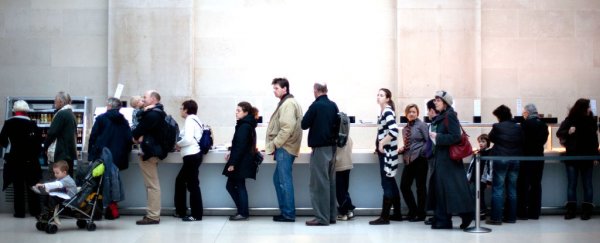There's nothing quite like the tedium of waiting your turn in a really long queue, willing it to move faster than a sluggish, interminable drawl. And the worst part is, it seems we've been doing it wrong all this time.
Researchers from the University of Southern Denmark say that we've got the concept of queues backward. According to the Nash equilibrium, our current system of queueing is completely inefficient.
How come? The curse of the first-in-first-out queue discipline, which happens to be the title of the researchers' paper, is that it encourages everybody to line up early in order to get their hands on the desired thingy in question.
Of course, at first glance, this seems entirely fair and equitable. And why shouldn't it? After all, we've enshrined it in our belief systems about how queues should operate, ie. 'the early bird gets the worm'. The only problem with this – apart from how the worm feels about it – is the end result of encouraging everybody to turn up early and form a queue creates, you guessed it, a queue. And often a long one. Not only is it painful, but it's a waste of everybody's time.
"The traditional way to settle a queue – called first-in-first-out – is perhaps what many associate with a normal and fair queue. Those who have been in the queue the longest will be served first when there is availability," said Lars Peter Østerdal, co-author of the study, to ScienceNordic's Lena Fels. "A lot of people have the incentive to join the queue early, which means that they stand in line for a long time. Of all the options available to them, this is the worst one."
The preferable alternative, the researchers contend, is to literally turn queues around. If the last person to join a queue were to be served first, there'd be no incentive for the early birds to get in and create what amounts to a massive backlog. People would join queues at a slower rate, lines wouldn't be as long, and queuers would wait less.
Ultimately, everybody would get served quicker. It's a win-win for everybody. (Except the people who make those retractable queue tape barriers. They'd absolutely hate it.)
If the researchers' theory is correct, and we were somehow able to change our way of thinking about queues entirely, there could be massive potential benefits for people's time. A study in 2009 found that Britons spend an astonishing six months of their lives standing in queues. Wouldn't it be better to spend that time doing something else instead?
